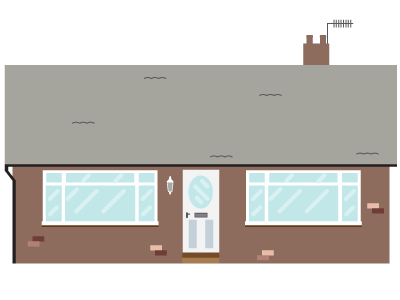Buying a Bungalow
- Bungalows are ideal for downsizers, families, and those seeking a low-maintenance home, providing single-story living with the potential for customisation.
- Factors like property condition, location, and budget are crucial when buying a bungalow. Be aware of potential issues that could be found in your home survey, such as damp and outdated features, often found in older bungalows.
- Many bungalows built between the 40s and the 70s are of concrete construction which are vulnerable to unique defects, but 1930s bungalows are highly desirable.
Are you tired of climbing stairs? Dreaming of single-story living? A bungalow might be the perfect home for you. Let's explore the pros, cons, and everything in between for buying a bungalow.
What is a bungalow?
A bungalow is a single-story home typically built without stairs and most commonly has a pitched roof. This makes them perfect for people with mobility issues or looking for a low-maintenance home. Bungalows can also be a good option for families seeking a spacious and affordable home. They are typically easier to heat and cool than two-storey homes and require less upkeep.
They also often come with larger plots of land than other properties, an advantage if you plan to extend. Our experienced Structural Engineers can help you out with a consultation if you need a chimney breast removal or work done to a load-bearing wall.
Why are 1930s bungalows so popular?
Bungalows arrived in the UK in the 1920s and became very popular by the 1930s as quality, low-cost housing. They are considered to be better quality than their modern counterparts due to their Art Deco charm and the common use of pre-fabricated concrete in the 40s-70s.
1930s bungalow renovations are being tastefully retrofitted all over the country to honour the history of the home. With 29% of Brits describing the bungalow as their ideal home, and occupants rating is 8.15/10 on average. A vintage one-story wonder may be the ideal home for you.
Source: The Independent.
Choose SAM for your bungalow purchase
You'll have a SAM case handler and an experienced solicitor for bungalow sales and purchases to guide you throughout the whole process from initial contact to completion day.
All our quotes are backed by a no-sale, no-fee policy which protects you in the event of a purchase or sale falling through.
Prefabricated reinforced concrete bungalows
There are two main types of bungalows: traditional and prefabricated reinforced concrete (PRC). Traditional bungalows are typically made of brick or stone, while PRC bungalows are made of concrete panels. PRC bungalows are more common in the UK, but not as popular as traditional bungalows due to their construction issues.
PRC bungalows were constructed using prefabricated concrete panels that are prone to damp and condensation; they can also suffer from structural weaknesses due to corrosion and metal fatigue. They are usually built with a flat roof which is less durable.
Due to construction-related problems, obtaining a mortgage for a PRC bungalow can be challenging. Some lenders may be hesitant to offer loans for these properties as they will want assurances on their loan investment.
It was because of the discovery of these defects in the 1980s, when Right to Buy was originally launched, which led most major lenders to rule that they would no longer accept these properties as satisfactory security for mortgages.
If you are considering replacing the panels of a PRC bungalow, you would be well advised to research planning permission and building regulations appropriate to the work.
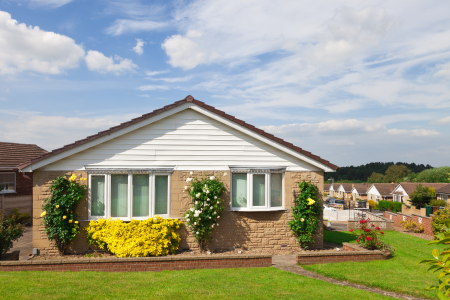
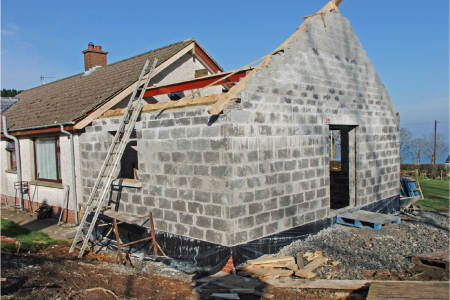
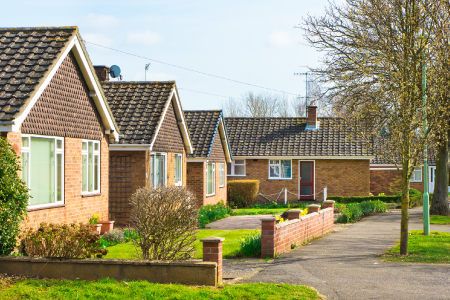
Who are bungalows for?
- Downsizers: People looking to reduce their upkeep of a larger home often find bungalows appealing. They offer comfortable, manageable living spaces without the hassle of stairs.
- Families with young children: Bungalows can provide a safe and secure environment for children. The single-story layout means parents can easily keep an eye on them.
- People with mobility issues: Perhaps the most obvious group since bungalows are designed for accessibility. They eliminate challenges posed by stairs, making daily life easier.
- Those seeking low maintenance: Bungalows generally require less care than multi-story homes. This can be a significant advantage for busy professionals or retirees.
Pros and cons of buying a bungalow
Most bungalows in the UK were built in the 1930s and 40s. While generally sturdy, age can lead to issues like worn-out materials and outdated features. However, compared to multi-story homes, bungalows often have advantages like reduced risk of subsidence.
Pros
- Accessibility: No stairs, making them ideal for people with mobility issues or those anticipating future needs.
- Lower maintenance: Fewer floors, windows, and exterior walls generally mean less maintenance.
- Security: Ground-floor living can offer a sense of increased security for some.
- Potential for expansion: Many bungalows have the potential for extensions or loft conversions.
- Quiet location: Bungalow estates often have a quieter atmosphere compared to busier streets.
- Investment potential: Bungalows can be a good investment, especially in areas with high demand.
Cons
- Limited space: Compared to multi-story homes, bungalows might offer less overall living space.
- Higher cost per square foot: Bungalows often command a premium price due to demand.
- Renovation challenges: Older bungalows may require significant renovations to modernise.
- Limited resale market: While demand is high, the target market for bungalows is smaller than other property types.
- Lack of privacy: Ground-floor living might mean less privacy compared to upper floors in a multi-story home.
What to look for when buying a bungalow
Property condition
- Structural integrity: Ensure the bungalow's foundation and overall structure are sound. Look for signs of subsidence or structural damage.
- Roof condition: Check for leaks, damage, or the need for potential replacements.
- Windows and doors: Assess the condition of windows and doors for energy efficiency and security.
- Electrical and plumbing systems: Ensure these systems are up-to-date and functioning correctly.
- Insulation: Proper insulation is crucial for energy efficiency and comfort.
Layout and space
- Room sizes: Consider if the room sizes meet your needs and lifestyle.
- Storage space: Evaluate the available storage options within the bungalow.
- Garden and outdoor: Assess the size and condition of the garden.
- Potential for extension: If you plan to expand in the future, consider the property's potential for extensions.
Location
- Amenities: Check the proximity to shops, schools, public transportation, and other amenities.
- Neighbourhood: Consider the overall atmosphere, safety, and property values in the area.
Additional factors
- Energy efficiency: Look for features like double glazing, insulation, and energy-efficient appliances.
- Potential for customisation: Assess the ease of making changes to the bungalow to suit your preferences.
In our recent survey, 16% of homeowners found defects; including 2% who were able to pull out of a bad purchase, 7% who were able to negotiate a better price, and sadly, 7% of homeowners who did not get a survey and discovered defects after the purchase.
12 of the 39 who remembered how much these defects cost to remedy spent over £5,000
Don't burn your money, book a survey.

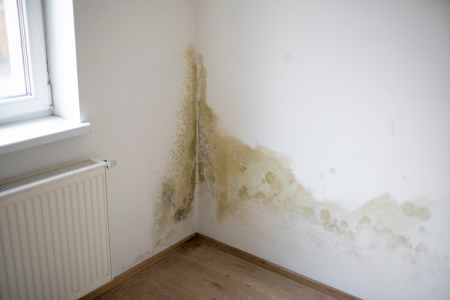
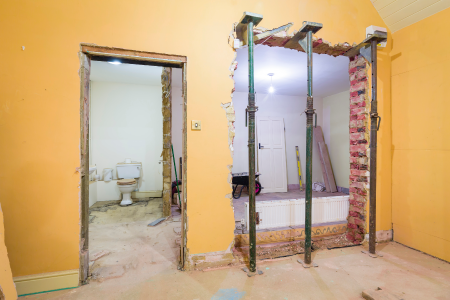
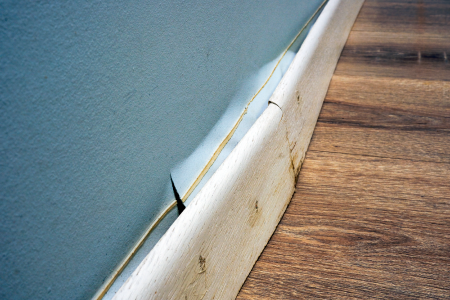
Common problems with bungalows
- Due to their single-story nature, bungalows can be prone to damp and condensation issues, especially in colder months.
- With all rooms on one level, privacy can be a concern, particularly for families or shared living arrangements.
- Many older bungalows may have outdated interiors and require modernisation.
- Older bungalows might be less energy-efficient compared to newer homes, leading to higher utility bills.
- Larger gardens that often accompany bungalows can require more maintenance.
How to get a bungalow mortgage
Securing a mortgage for a bungalow can be similar to any other property, but there are specific considerations to be aware of.
Standard construction
If your bungalow is built of traditional materials like brick or stone, obtaining a mortgage is generally straightforward. Most lenders offer competitive rates for these properties.
Non-standard construction
Bungalows built with materials like prefabricated reinforced concrete (PRC) or timber frames might pose challenges. Some lenders specialise in these types of properties, so it's essential to work with a mortgage broker experienced in this area.
Ever wondered what the difference is between standard and non-standard construction?
Mortgage brokers
A mortgage broker can help you find the best deal by comparing lenders and their criteria for bungalow mortgages.
What affects mortgage approval?
- Deposit size: A larger deposit often improves your chances of securing a mortgage and obtaining a better interest rate.
- Credit score: A good credit history increases your eligibility for favourable mortgage terms.
- Income and affordability: Lenders will assess your income and outgoings to determine your ability to repay the mortgage.
- Property valuation: The property's value will influence the amount you can borrow.
Tips for getting a bungalow mortgage
- Research lenders: Explore different lenders to find the best options for your circumstances.
- Seek professional advice: A mortgage broker can provide expert guidance and help you navigate the process.
- Prepare thoroughly: Gather all necessary documentation, including proof of income, employment, and identification.
Are bungalows hard to sell?
The short answer is: not necessarily. Bungalows have a specific target market, primarily downsizers, retirees, and people with mobility issues. This focused demand can often lead to brisk sales.
- Property condition: A well-maintained bungalow with modern amenities is more likely to attract buyers quickly.
- Location: Desirable areas with good amenities can increase demand.
- Market conditions: General housing market trends can impact the sale of any property, including bungalows.
- Pricing: Overpricing can deter potential buyers, while under-pricing might not maximise your return.
Tips for selling a bungalow
- Targeted marketing: Focus your marketing efforts on demographics likely to be interested in bungalows.
- Professional valuation: Obtain an accurate valuation to price your bungalow competitively.
- Presentation: Ensure your bungalow looks its best with decluttering and minor renovations if needed.
- Highlight benefits: Emphasise the specific advantages of bungalow living to attract potential buyers.
- Words
What sort of home buyers survey would a bungalow require?
The main factor here is the age of the property.
You are always advised to get a Level 3 Survey if you are considering buying a bungalow that is more than 70 years old. This applies to any property built before the 1950s and most bungalows were built before this.
PRC bungalows were normally built around or slightly later than 1947. They are likely smaller than other bungalows and unlikely to be extended. A Level 2 Survey (HomeBuyer Report) is sufficient for these properties - they are generally simple in design and quite small - and is recommended given the structural issues described. If the PRC panels have been replaced, you would normally get a Level 2 Survey before buying a bungalow.
For non-PRC bungalows built later than the 1950s, you would normally get a Level 2 Survey. You would only get a Level 3 if you're buying an unusually large bungalow and/or if it has been extensively refurbished or extended.
Andrew started his career in 2000 working within conveyancing solicitor firms and grew hands-on knowledge of a wide variety of conveyancing challenges and solutions. After helping in excess of 50,000 clients in his career, he uses all this experience within his article writing for SAM, mainstream media and his self published book How to Buy a House Without Killing Anyone.
Caragh is an excellent writer and copy editor of books, news articles and editorials. She has written extensively for SAM for a variety of conveyancing, survey, property law and mortgage-related articles.

